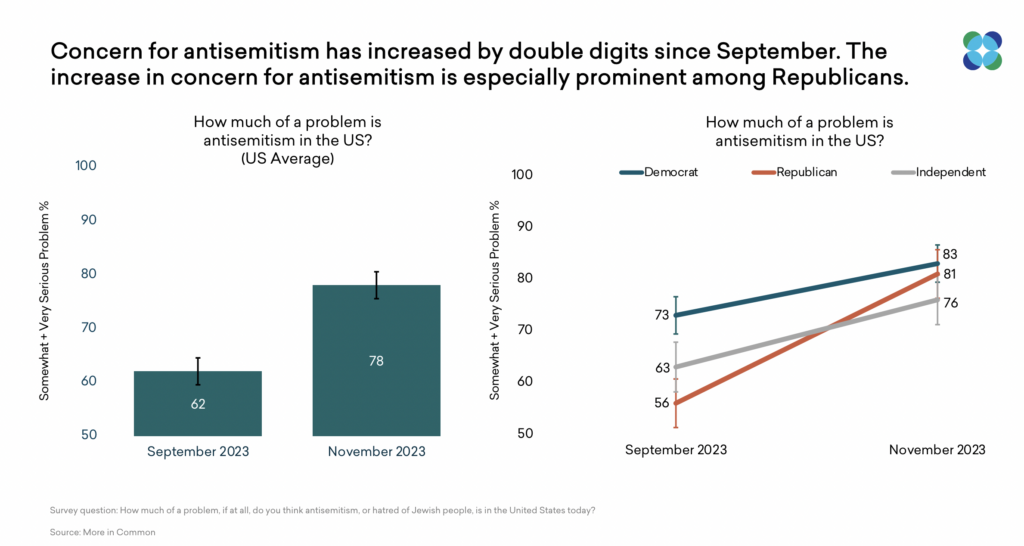September Survey
Polling Firm: YouGov
Sample Size: n=1,392 US Adults (nationally representative, including oversample of n=107 Jewish Americans)
Fieldwork Dates: September 15-20, 2023
Margin of Error: +/- 3.1 for US average
November 2023 Survey
Polling Firm: YouGov
Sample Size: n=1,000 US Adults (nationally representative, including oversample of n=107 Jewish Americans)
Fieldwork Dates: November 20-27, 2023
Margin of Error: +/- 3.4 for US avg.
Changing Attitudes on Antisemitism in America, Before and After 10/7
December 14, 2023
Topic
American Identity
Key Takeaways
- On average, after October 7, Americans are significantly more likely to see antisemitism as a problem in the US.
- The percentage of Americans who see antisemitism as a problem in the US increased by 16 percentage points (62% to 78%).
- The largest increase in concern about antisemitism was with Republicans (56% to 81%). Concern among Democrats increased from 73% to 83%.
- Americans across the political spectrum feel a responsibility to stand up to antisemitism and see it as a threat to freedom.
- The most common response among Americans when asked whether antisemitic views are expressed by a particular political party has remained “Don’t know”‘; Democrats shifted by 10 points towards attributing such views to both parties equally and Independents shifted by 11 points towards attributing such views to mostly Democrats.
In October 2023, More in Common launched an online community of approximately 150 Americans titled “Americans in Conversation”. We engage them in an online survey platform. From November 21-30, 2023, we asked Americans about antisemitism in America. A total of N=135 US participants completed the activity, with participants roughly representative across US Census demographics such as age, gender, race, and partisanship.
16%
the increase in the percentage of Americans who view antisemitism as a problem in the US from before to after October 7, 2023.
81%
the percentage of Republicans who are concerned about antisemitism after October 7, 2023, compared to 56% before.
83%
the percentage of Democrats who are concerned about antisemitism after October 7, 2023, compared to 73% before.
Overview
On October 7, 2023, the terrorist organization Hamas executed a large-scale attack against Israel, killing at least 1,200 people and taking over 200 hostages. The terrorist attacks and subsequent Israeli military response in Gaza have fueled large-scale protests and activism across the US, and the country has experienced a surge in instances of antisemitism and violence directed towards Jewish Americans, as well as a significant spike in threats and violence against Muslim Americans and Arab Americans.
In September 2023, weeks before the terrorist attack, More in Common was engaged in public opinion research of Americans’ attitudes towards antisemitism. Between September 15 and 20, we surveyed 1,392 Americans on questions such as the extent to which they viewed antisemitism as a problem in the US, what they viewed as sources of antisemitism, and the extent to which they felt a responsibility to stand up to antisemitism.

In November 2023, recognizing the severity of the situation and appreciating that we were in a unique position to assess changes in attitude among Americans before and after 10/7, we fielded a second national survey to 1,000 Americans asking a battery of questions about antisemitism that was identical to questions we asked in September. Thus, while the samples were of different Americans, we could compare data on the same question across two nationally-representative populations of American adults.
The scope of this report, therefore, is intentionally narrow. We only include data on questions about antisemitism that we asked Americans both before and after 10/7. We do not report on many important issues that have received widespread media coverage, such as Americans’ attitudes towards protests on college campuses, threats and violence directed at Muslim and Arab Americans, and attitudes towards Hamas, Israel, and the conflict in Gaza, among others. The absence of such data in no way reflects our assessment of the significance of those developments, but rather our focus on keeping the scope limited to data where we can report on change with scientific rigor.
Download Full Report
Explore the depth of our research at your fingertips. Get the complete insights by downloading the full report today.
Sign Up for Our Newsletter
What unites and divides Americans today? This newsletter takes a closer look at issues pressing on America’s social and political fabric and provides recommendations for how to strengthen ties to keep us bound together.